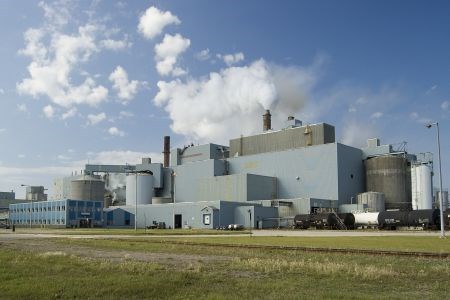A sense of relief and satisfaction washed over council members and the people of Terrace Bay following a Sept. 16 announcement that the local kraft mill would officially resume operations.
Owned by the Buchanan Group, Terrace Bay Pulp Inc. had been under creditor protection for 19 months. Not long after the downturn in the global economy, the mill closed its doors in March 2009, laying off 385 employees.
“I called it the perfect storm,” said the town’s mayor Michael King.
“The Canadian dollar was at par, a lot of large newspapers failed and the U.S. housing market collapsed. That put a considerable amount of kraft pulp on the market, which depressed the price of pulp.”
He explained that 50 per cent of the residual chips produced by sawmills are sent to the pulp mill. However, sawmills were impacted as well, reducing not only their main lumber product but also the chip byproduct.
Consequently, Terrace Bay Pulp Inc. ended up with three months worth of production it couldn’t sell, according to King.
The kraft mill produces pulp for finer papers like tissues, feminine products and diapers. It is the slow-growth conifers from the boreal forest that contain the tightly woven fibres in the wood required for these types of products.
The mill’s daily output was 1,100 tonnes of pulp. It employed 340 workers and had an annual operating cost of $277 million, according to King, who said its closure had a significant ripple effect on the surrounding communities and sawmills.
With more than 400 suppliers affected and the loss of taxes, the last year and a half was certainly a darker period for the small North Shore community.
But council didn’t lose hope. Instead, it took a proactive approach and began working closely with the company to find solutions.
A number of brainstorming sessions with the mill’s administration resulted in an application to the province for a $25-million loan guarantee.
King explained that when the municipality fills out grant applications, it shows the potential of an operation and its impact on the economy. However, businesses function in terms of business plans, which involve sales and profits. So in partnership with the companyand Township of Schreiber, they put together an application to the provincial government which showed the mill had an annual economic impact of $2.45 billion, of which $79 million was government revenues.
King also said the pulp mill’s economic footprint resulted in the creation of 11,866 support jobs in the region and throughout Ontario when Terrace Bay Pulp and supporting sawmills operated. Forestry-related economic activity is created in 14 communities and 16 First Nations communities.
Several meetings led to a slide presentation alongside the application for the loan. They were able to obtain and retain the $25 million while the company sought private funding. In the end, Terrace Bay Pulp was able to establish a viable business plan, and Callidus Capital Corporation provided the necessary financial support to allow the company to exit creditor protection and resume operations.
“It was a different thing for a town to do,” King said. “We’re very pleased that in the end it was successful.”
The Buchanan Group did not respond to an interview request by Northern Ontario Business.




